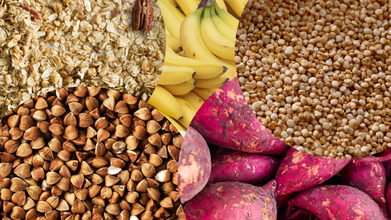- Health Conditions A-Z
- Health & Wellness
- Nutrition
- Fitness
- Health News
- Ayurveda
- Videos
- Medicine A-Z
- Parenting
- Web Stories
Coca-Cola To Launch Cane Sugar Version In US: Is It Really Healthier?

Credits: Canva, NYT via Redux
Coca-Cola has officially announced that it will introduce a cane sugar-sweetened version of its flagship soda in the United States this fall. The move has comes days after former President Donald Trump’s pre-emptive Truth Social post, has sparked both nostalgia and renewed debate about the health impacts of soda sweeteners.
The new cane sugar Coke will be sold alongside the existing version that uses high-fructose corn syrup (HFCS), a formulation the company has used since 1984. Diet Coke and Coke Zero, which use artificial sweeteners such as aspartame, will remain unchanged, reports Time.
Cane Sugar Is Coming, But Why Now?
In a statement issued during its second-quarter update, Coca-Cola said the addition is part of its “ongoing innovation agenda” aimed at offering consumers more choices to match changing tastes and dietary preferences.
“This addition is designed to complement the company’s strong core portfolio and offer more choices across occasions and preferences,” said Coca-Cola on Tuesday. CEO James Quincey, speaking on a call with investors, acknowledged Trump’s recent involvement.
“We appreciate the President’s enthusiasm for our Coca-Cola brand,” he said. “We are definitely looking to use the whole tool kit of available sweetening options.”
Coca-Cola with cane sugar isn’t new to American shelves. Mexican Coke, or MexiCoke, has long been popular for its glass bottle and “original recipe” using cane sugar. That version has gained a cult following since its U.S. import began in 2005.
Trump and the Push for “Real Sugar”
Trump, a well-known Diet Coke loyalist, reportedly drinking up to 12 a day during his presidency, surprised many by advocating for real cane sugar.
“I have been speaking to Coca-Cola about using REAL Cane Sugar in Coke in the United States, and they have agreed to do so,” Trump posted on July 16. “This will be a very good move by them. You’ll see. It’s just better!”
While the company has not confirmed if Trump’s advocacy influenced the rollout, his comments have intensified public interest in the ingredient change.
ALSO READ: Donald Trump Says Cane Sugar Is ‘Just Better’ Than Corn Syrup
The Health Debate: Is Cane Sugar Better Than Corn Syrup?
From a health standpoint, the switch has raised questions: Is cane sugar a healthier option than HFCS? According to experts, not really.
“For all practical purposes, they’re the same,” said Marion Nestle, nutritionist and professor emerita of food studies at New York University to Time. “They taste the same. They have the same number of calories. They do exactly the same things in the body. Everybody would be healthier eating less of both of them.”
High-fructose corn syrup became a staple sweetener in U.S. processed foods and beverages during the 1980s due to lower costs and a surplus of corn. But its use has declined over the past decade. According to the USDA, domestic production of corn syrup dropped nearly 20% from 2006 to 2016.
Despite the reduction, concerns about HFCS remain.
In April, Health and Human Services Secretary Robert F. Kennedy Jr. called sugar “poison” and described high-fructose corn syrup as “a formula for making you obese and diabetic.”
He praised food chains like Steak ’n Shake for switching to cane sugar Coca-Cola, saying it aligned with his campaign to “Make America Healthy Again.”
Consumer Choice or Clever Rebrand?
While the move might appeal to those who grew up drinking the pre-1984 formulation or prefer the taste of Mexican Coke, some nutritionists argue this is more of a branding play than a health initiative.
“There’s no nutritional upgrade happening here,” said a registered dietitian quoted in a recent AP report. “It’s just the same sugary drink, wearing a slightly more natural mask.”
Still, Coca-Cola’s introduction of cane sugar Coke reflects broader shifts in consumer preferences toward perceived “natural” ingredients, even when those ingredients carry the same health risks as their processed counterparts.
Whether cane sugar or HFCS, health professionals continue to stress moderation. Sugary drinks, regardless of sweetener type, have been linked to weight gain, metabolic issues, and increased risk of type 2 diabetes.
Gemma Atkinson Says Keto Diet Has Helped Her Daughter With Epilepsy

Credits: Canva
Former Hollyoaks star Gemma Atkinson's six-year-old daughter is undergoing treatment for epilepsy. Gemma revealed that Mia, her daughter's condition was discovered after she began to experience absence seizures and episodes of lost awareness.
Gemma spoke about Mia's health journey on her podcast Just As Well, the Women's Health Podcast. She explained how the diagnosis has shaped her family’s lifestyle and highlighted the critical role diet can play in managing epilepsy.
What Are Absence Seizures?
As per CDC, epilepsy is a neurological condition that affects the brain and causes recurrent seizures. These seizures can take many forms, from convulsions to subtle lapses in awareness. In Mia’s case, she suffers from absence seizures. These episodes typically last a few seconds, during which the child appears to be staring blankly or “switching off.” While they may seem mild, repeated episodes can disrupt learning, daily activities, and overall quality of life.
Although epilepsy cannot be cured, treatments ranging from medication to lifestyle interventions can help control seizures. For Mia, medical professionals suggested that diet could play a significant role in supporting brain health.
Can Diet Help Your Brain?
Gemma also shared that the doctors have recommended ketogenic diet or the keto diet for Mia. This means Mia can have food high in fats, moderate in protein, and low in carbohydrates.
The diet was first introduced in the 1920s, was originally developed as a treatment for epilepsy before the advent of modern medications. Research shows that it can help rewire brain function and reduce seizure activity, particularly in children who do not respond well to standard treatments.
“The doctor told me, ‘If you can get her on a keto diet, it could help with brain function,’” Gemma explained. “The improvement we’ve had has been amazing. For the last six months, she’s had no seizures at all, touch wood.”
Mia now starts her day with an omelet for breakfast and Gemma also adds extra nutrients like collagen to her yogurt. While the diet requires careful planning and strict adherence, it has brought encouraging results, with both the family and Mia’s school reporting a significant reduction in symptoms.
Despite the positive progress, Gemma emphasized that Mia’s condition requires ongoing monitoring. Epilepsy management often involves regular check-ups, symptom tracking, and dietary adjustments. “We’re constantly monitoring her, but the last year has been such a positive turnaround,” she said.
Experts caution that while the keto diet can be beneficial, it must be followed under medical supervision to avoid nutritional imbalances. Gemma’s proactive approach, researching the condition and working closely with healthcare professionals, has given Mia a strong foundation for managing her epilepsy.
Epilepsy Awareness
Gemma is bringing public's attention to epilepsy, a condition that is often misunderstood or overlooked. bsence seizures, in particular, may go unnoticed by parents or teachers, as they can resemble daydreaming. Raising awareness can help families recognize the signs early and seek timely medical advice.
Epilepsy affects millions worldwide, and while it cannot yet be cured, advancements in diet-based therapy, medication, and supportive care continue to improve outcomes.
Are All Carbs Bad? Here Are 5 Healthy Carbs You Can Try

Credits: Canva
For years, people have been scared of carbohydrates. It is seen as the 'No-No' in the food world. Wherever you look round, if you want to lose weight, or get fit, you are often told to not consume carbohydrates.
The term carbohydrate itself has been cast as the villain of the nutrition world. Many popular diets and fitness trends often link them to weight gain, type 2 diabetes, and a host of chronic conditions. But nutrition experts stress that not all carbs are created equal.
While heavily processed foods loaded with sugar and refined flour do raise health concerns, there are many carbohydrate-rich foods are nutrient-dense, fiber-packed, and highly beneficial for overall well-being. In fact, they are healthy and even recommended. Often in the garb of what social media tells us, we miss them out. You would be shocked to know that some of the healthiest staples in our diets, from whole grains to tubers and fruits, fall into the high-carb category.
Here’s a closer look at five high-carb foods that not only provide energy but also deliver significant nutritional value.
Quinoa
Quinoa, often mistaken for a grain, is actually a seed classified as a pseudocereal. Over the past decade, it has become a star ingredient in health-conscious kitchens worldwide.
Cooked quinoa is about 70% carbohydrate, but its nutritional profile goes far beyond carbs. It offers a balanced combination of fiber, protein, and essential minerals. Studies link quinoa consumption to better blood sugar management and improved heart health, thanks to its abundance of plant compounds and antioxidants.
Another major advantage? Quinoa is naturally gluten-free, making it a popular alternative for those with wheat sensitivities. Its high fiber and protein content also make it particularly filling, which can support both weight management and digestive health.
Oats
Few foods embody the phrase “comfort and health” quite like oats. Known as one of the healthiest whole grains, oats deliver a rich blend of vitamins, minerals, and antioxidants.
Raw oats are about 70% carbohydrate, with a single cup providing 54 grams of carbs—including 8 grams of fiber. Of special note is beta-glucan, a type of soluble fiber unique to oats that has been extensively studied for its heart-protective effects.
Research shows that eating oats regularly can lower cholesterol levels, reduce the risk of heart disease, and help manage blood sugar—particularly in people with type 2 diabetes. They’re also more protein-rich than most other grains, and their satiating quality makes them an excellent choice for weight management.
Buckwheat
Despite its name, buckwheat has no relation to wheat and is entirely gluten-free. Like quinoa, it belongs to the pseudocereal family and offers a nutritional punch that rivals traditional grains.
Raw buckwheat contains 75 grams of carbohydrates per 100 grams, while cooked groats contain nearly 20 grams. Beyond its carb content, buckwheat is rich in protein, fiber, and an impressive array of antioxidants and minerals.
Early studies suggest it may support heart health by improving blood pressure and cholesterol levels, as well as aiding blood sugar control, an especially valuable benefit for people at risk of diabetes. Its versatility in both sweet and savory dishes also makes it a practical choice for everyday meals.
Bananas
Bananas have long been a go-to snack for athletes, children, and anyone in need of quick energy. A large banana provides about 31 grams of carbohydrates, primarily from natural sugars and starch.
But bananas aren’t just about energy. They’re packed with potassium, vitamin C, and vitamin B6, along with helpful plant compounds. High potassium levels are particularly beneficial for heart health, helping to regulate blood pressure and support proper muscle and nerve function.
Interestingly, the ripeness of a banana changes its nutritional makeup. Green, unripe bananas contain more resistant starch, a type of carbohydrate that acts like fiber, feeding beneficial gut bacteria and supporting digestive health. As bananas ripen, starch turns into natural sugars, making them sweeter but less fibrous. Both versions, however, have health benefits.
Sweet Potatoes
Vibrant, versatile, and naturally sweet, sweet potatoes are another carbohydrate-rich food with outstanding nutritional value. A half-cup serving of cooked sweet potatoes with skin provides about 21 grams of carbohydrates, along with fiber, sugar, and starch.
They also contain key vitamins and minerals, particularly vitamin A (in the form of beta-carotene), vitamin C, and potassium. These nutrients play essential roles in vision, immunity, and overall cell health.
Perhaps most impressive, sweet potatoes are loaded with antioxidants—compounds that fight free radicals and may reduce the risk of chronic diseases like cancer and cardiovascular conditions. Their natural sweetness also makes them a healthier alternative to refined carb-based desserts or snacks.
Should You Rethink What Carbs Mean?
The bad reputation surrounding carbohydrates often overlooks a crucial fact: carbs are the body’s primary source of energy. What matters most is the type of carbs consumed. Refined, sugar-laden options offer little nutrition, while whole-food sources like quinoa, oats, buckwheat, bananas, and sweet potatoes deliver fiber, vitamins, minerals, and powerful antioxidants.
For most people, there’s no need to shun high-carb foods. Instead, the focus should be on choosing unprocessed, nutrient-dense varieties that nourish the body while providing steady energy.
As nutrition experts continue to emphasize, balance and quality, not restriction, are the true keys to a healthy diet.
Soaked vs. Dry Raisins: Nutritionists Reveal Which Packs More Benefits

Credits: Canva
Raisins, made by drying grapes, are a popular snack loved for their natural sweetness and nutrient content. While people enjoy them both dry and soaked, how you consume them can influence not only their taste but also the health benefits they provide.
Incorporating soaked raisins into your daily routine is simple and versatile. You can enjoy them plain in the morning, mix them into your breakfast oats or yogurt, or even add them to smoothies and salads. Just a small handful can make a noticeable difference in energy levels, digestion, and overall vitality. Over time, this small change can support long-term wellness, making soaked raisins an easy and effective addition to a balanced, health-focused lifestyle. So which option is truly better for your body, soaked or dry raisins?
To get some clarity, we spoke with Celebrity Ayurvedic Nutritionist Shweta Shah, founder of Eatfit24/7, who explained which form offers more advantages for overall wellness.
Soaked vs. Dry Raisins: What’s Healthier?
Raisins are packed with nutrients like iron, antioxidants, and natural sugars that support general health. According to Ayurveda, soaked raisins tend to offer greater benefits than dry ones. Nutritionist Shweta Shah shared why this is the case and when dry raisins might still be useful.
Soaking raisins overnight can unlock their full nutritional potential. Shah explains, “Dry raisins contain phytic acid, which can prevent your body from absorbing important minerals like calcium and iron. Soaking helps reduce this effect, allowing your body to take in nutrients more effectively.”
Benefits of Soaked Raisins:
- Better Nutrient Absorption: Soaking reduces phytic acid, making minerals like iron and magnesium easier for the body to absorb.
- Easier Digestion: Soaked raisins soften and are gentler on the stomach, making them ideal to eat on an empty stomach in the morning. “They help stimulate digestive fire without causing excess heat in the body,” adds Shah.
- Cooling Effect: While dry raisins can have a warming effect, soaking them in water makes them cooling. This can help with acidity, constipation, and even skin issues.
- Supports Liver Detox: Soaked raisins or raisin water work as a mild detox, promoting better liver function, improved metabolism, and reduced toxin buildup.
When Dry Raisins Might Be Preferable
Although soaked raisins have many benefits, dry raisins also have their uses. Shah points out that they can be helpful in certain situations:- During cold weather, to provide natural warmth
- For people with strong digestion
- As a quick energy source while trekking, fasting, or during active routines
However, she warns that eating too many dry raisins, especially in hot weather, can cause heat-related issues like ulcers, skin irritation, and acidity.
In short, soaked raisins aren’t just a morning habit, they are an Ayurvedic tonic packed with cleansing, cooling, and nourishing benefits. As Shah notes, “Soaking raisins for 6–8 hours turns them into a powerful wellness booster that aids digestion, detoxification, and women’s health.” Whether you want to improve digestion, cool your system, or simply start the day on a healthy note, a handful of soaked raisins might be the perfect choice.
© 2024 Bennett, Coleman & Company Limited

